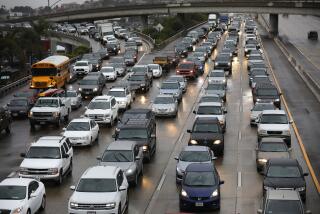‘91 Cars Trail ‘88s in Gas Economy : Fuel: The average was 28.2 miles a gallon in a federal study, compared to an all-time high of 28.8 three years ago.
- Share via
WASHINGTON — Average fuel economy for 1991 model-year cars was 28.2 miles a gallon, up slightly from the 1990 model year but still below fuel economy levels achieved in 1988, federal documents released Monday showed.
The Transportation Department documents also show that while U.S. auto makers marginally increased fuel efficiency in the 1991 model year, their foreign competitors registered a slight decline in mileage. Still, the foreign-made fleet remained more fuel efficient on average than the American fleet.
The documents were obtained from the National Highway Traffic Safety Administration by Public Citizen, a lobbying group formed by consumer activist Ralph Nader.
Public Citizen said the documents were based on preliminary data indicating the 1991 model-year fleet averaged 28.2 m.p.g., a small increase over the 1990 fleet average of 28.1 m.p.g.
However, the group said the 1991 rating was still below the fuel economy levels achieved in 1988, when average fleet mileage was 28.8 m.p.g., the all-time high.
The documents also show that U.S. auto makers increased their average fuel efficiency for passenger cars from 26.9 m.p.g. in the 1990 model year to 27.3 m.p.g. for 1991.
In contrast, foreign auto makers had a decline in their average mileage rating from 29.9 m.p.g. for the 1990 model year to 29.7 m.p.g. for 1991.
For light trucks, the Transportation Department documents show average fuel economy for the 1991 model year was 21.2 m.p.g., up from the 1990 level of 20.8 m.p.g. but still below the all-time high of 21.7 m.p.g. achieved in 1987.
As with passenger cars, the fuel efficiency of imported trucks went down from the 1990 average of 23 m.p.g. to 22.9 m.p.g. in 1991 while domestic trucks had mileage improvements, from 20.3 m.p.g. in 1990 to 20.9 m.p.g. in 1991.
Public Citizen said that, overall, the Transportation Department documents made it clear why Congress needs to raise federal fuel economy requirements for auto makers.
Public Citizen said the documents clearly illustrate auto makers are not interested in making substantial fuel efficiency gains over the federally required fleet average of 27.5 m.p.g.
Environmentalists charge that fuel economy ratings generally have declined over the last three years because auto makers are more interested in manufacturing and promoting high-performance luxury cars that have big profit margins.
“Unless Congress takes immediate, decisive action to alter current trends and set higher standards, we will continue to lose the gains realized over the past 15 years in auto fuel efficiency,” said Joan Claybrook, president of Public Citizen.
Auto makers say the fuel economy average has not risen because consumers prefer mid-sized or larger cars and, thus, dealers do not sell many small, fuel-efficient cars. The auto makers point out that the fleet mileage average is calculated on the basis of cars actually sold.
More to Read
Sign up for Essential California
The most important California stories and recommendations in your inbox every morning.
You may occasionally receive promotional content from the Los Angeles Times.













